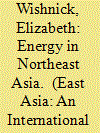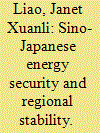| Srl | Item |
| 1 |
ID:
082389


|
|
|
|
|
| Publication |
2008.
|
| Summary/Abstract |
This article revisits a conventional interpretation of Sino-Japanese energy relations from geopolitical and zero-sum viewpoints. Contemporary Sino-Japanese disputes over the East China Sea and their scramble over a crude-oil pipeline from Russia have drawn global attention to the intensification of the rivalry between the two giant energy consumers. Beijing and Tokyo, however, have gradually found common interests resulting from business opportunities, environmental countermeasures, etc. Russia's failure in driving a wedge between China and Japan, and the United States' proactive engagement in Asia-Pacific energy issues, appear to provide new opportunities in which the East Asian powers' energy rivalry can be reduced
|
|
|
|
|
|
|
|
|
|
|
|
|
|
|
|
| 2 |
ID:
082385


|
|
|
|
|
| Publication |
2008.
|
| Summary/Abstract |
Although Northeast Asia typically is seen as an arena for conflict over energy supplies, complementary economic relationships would seem to make the region ripe for energy cooperation: Russia possesses major oil and gas resources, while China, Japan, South and North Korea all depend on imported energy. The four papers in this issue raise a number of important and, at times, neglected issues about the prospects for energy cooperation in Northeast Asia. While focusing on specific projects for energy supply and conservation, the authors implicitly raise broader theoretical questions about the prospects for and consequences of regional energy cooperation
|
|
|
|
|
|
|
|
|
|
|
|
|
|
|
|
| 3 |
ID:
082387


|
|
|
|
|
| Publication |
2008.
|
| Summary/Abstract |
The article examines Russia's New Energy Policy (NEP) and its impact on Northeast Asian security and the development of the Russian Far East. In contrast to analyses highlighting competition between China and Japan for Russian resources, to the contrary it is argued here that greater cooperation among consumer states in Northeast Asia would be beneficial for Russia. Although the NEP has resulted in changes in the composition of foreign investors in Russian energy projects, the author suggests that Moscow is interested in multinational cooperation in the energy sector because it would help diversify the regional energy market and contribute to the development of the Russian Far East and eastern Siberia.
|
|
|
|
|
|
|
|
|
|
|
|
|
|
|
|
| 4 |
ID:
082386


|
|
|
|
|
| Publication |
2008.
|
| Summary/Abstract |
The recent agreements concerning North Korea's nuclear program raise possibilities for providing North Korea with energy (oil and gas) to compensate for the termination of its nuclear program and of integrating it more broadly into the Northeast Asian economy. Russia has long wanted to play the role of provider of oil and gas to North Korea and these agreements open up new opportunities for it to do so. However, serious obstacles in the nature of North Korea's precarious economic situation and its consequences, international rivalries in Northeast Asia, and Russia's own energy policies present serious obstacles to the realization of Russia's ambitions as regards North Korea and as energy provider to Northeast Asia as a whole
|
|
|
|
|
|
|
|
|
|
|
|
|
|
|
|
| 5 |
ID:
082388


|
|
|
|
|
| Publication |
2008.
|
| Summary/Abstract |
The Sino-Japanese dispute over the East China Sea maritime resources was triggered by the unsettled maritime boundary and the territorial dispute over the Diaoyu/Senkaku Islands. The dispute has been ascribed by many to intensified competition between China and Japan over energy supply. However this article attributes the fundamental cause of the conflict to power politics and political distrust, which are deemed to have the key role in preventing the two governments from finding a solution. The article analyses the origin and the causes responsible for the Sino-Japanese dispute over the East China Sea gas exploration, and then proceeds to investigate the diplomatic dialogues to reveal the key obstacles in the process.
|
|
|
|
|
|
|
|
|
|
|
|
|
|
|
|